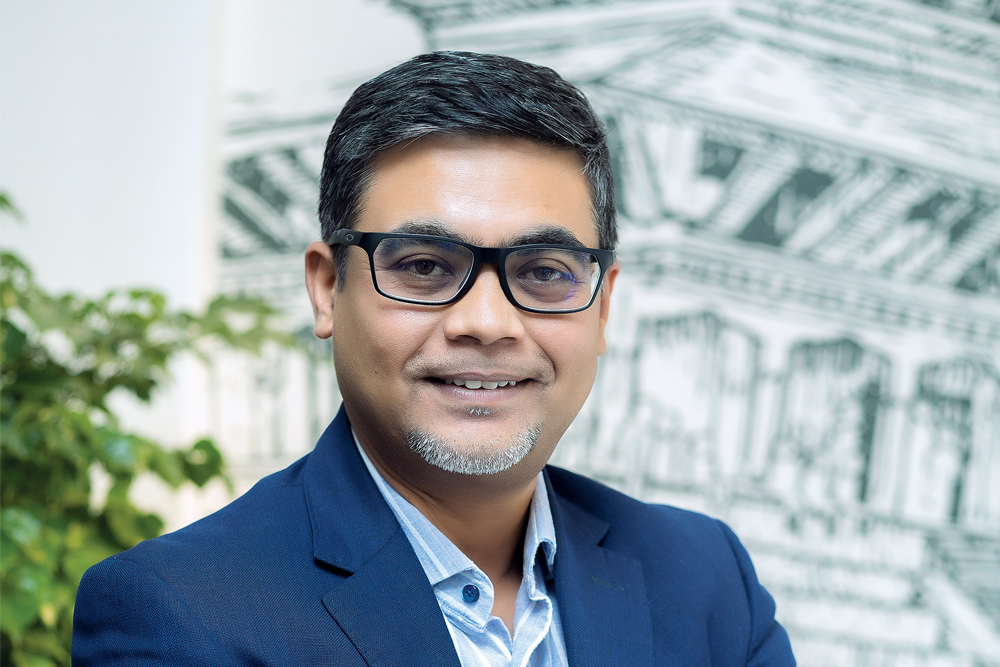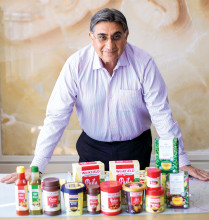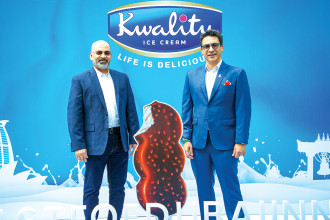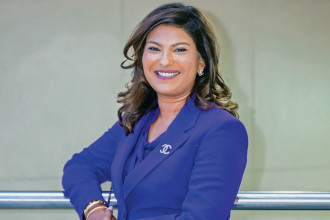
Tirthankar Basu is the Managing Director of Steelcase for India and SAARC region. He has an educational background in engineering, and research and development. Before Steelcase, Basu was working with Wipro.
“I am an electrical engineer and I have also done my MBA but fate directed me to a career in sales,” he shares, adding that interacting with different people and finding solutions are what make his work exciting.
Basu was recently in Kathmandu to inaugurate the opening of a flagship Steelcase dealer showroom when Business 360 caught up with him to learn about the company and the market and trends for office furniture in general. Excerpts:
Could you tell us about Steelcase?
Steelcase is 115-year-old and one organisation that has been repeatedly recognised among the top 10 in North America for businesses that have strived for innovation and grown over the last century. One of the key strengths is our ability to always look into the future. And another is design and thinking. Many people in the industry feel they can design anything and the customer will buy it but at Steelcase, we do things differently. We look into what the customer needs and we try to deliver on that. We do a lot of research and we work with the customers and the fraternity which has helped us stay ahead of the competition. At Steelcase it is all about looking ahead and being ready for anticipated demand. We have been leaders in this industry for the last 50 years. We lead the segment of the corporate furniture industry. In terms of our footprint, we have a presence in North America, Europe and APAC (Asia and Pacific). Our journey in APAC commenced in the 1970’s with Japan. We have been in India for 20 years and have started moving into Nepal, Bangladesh, Pakistan, Maldives and Sri Lanka.
How has the office furniture market evolved?
Over the last decade, we have recognised that work does not necessarily have to be at the office. The young generation is comfortable working from a café too. Previously, we used to talk about the workplace or office but now it is a place where work happens. Hence, today, Steelcase have healthcare, a booming vertical for us because work also happens there. The other sector is education because that is where students and teachers work. For us, that is also a workplace.
The industry overall is exciting and it is growing. It is funny but I wish there was a shortage of talent. When there is a shortage of talent, then the employer gives their staff the best and this is where we come in. Otherwise, furniture does not really fall among the top three needs. We come in when there is a need for employers to give their employees something extra once the salaries, food and transportation are done right. So, the physical space where the work happens becomes important for the employer to differentiate themselves.
The furniture industry, I would say, has become more complex. People looking at us as just a manufacturer is not really exciting. We also offer consultations. When people don’t know how to design their space and make it dynamic, we offer our service. Similarly, when architects come to us and ask us to help them understand what AI will do in the workplace, we help them with that too. Another aspect we look into is returning to office post-pandemic, which has become huge. In India, we still have large portions of city customers who mandate for their employees to return to the office at least three days a week. How does that workplace change from before Covid? Previously, going to the office was a given, nobody challenged that notion. Today, employees are getting incentives to return to the office three days a week. How will the work change? How will workplace change? That is an interesting aspect that we see right now.
Could you elaborate on the market for Steelcase in the SAARC region and Nepal particularly?
We are excited about the SAARC region and surprised with the kind of things that are happening. For instance, take Maldives as an example. It is a small island nation but interestingly, we do a lot of work with our channel partner, the government of Maldives, a progressive institution. We have not seen experiments of that scale or type in the entire Asia Pacific region. The government in Maldives is creating healthcare infrastructure using the best products and design which is Steelcase. It is investing in education where people train to get into a profession first. The Maldivian government said they didn’t want students to feel like this was a free dole-out by the government but wanted them to feel respected and they wanted to give the best and partnered with us. This was very interesting as I hadn’t heard such things from my customers. Therefore, I think in each of the countries, whether Nepal, Bangladesh, Sri Lanka and Pakistan, there is excitement. We have been in Nepal for just two years but have worked with a few big institutions like the Asian Development Bank, Daraz, Shanker Group and Jagdamba Group.
What is the collaboration with Fusion like?
One of the strengths of Steelcase is understanding the market and giving solutions rather than just bringing our existing portfolio and giving it to our partners. And to understand the market does take time. One aspect we are also proud of is that no other manufacturer conducts the amount and type of research that we do. This gives us an insight as to what is the right solution for the market and what is the market looking for. And we tweak our portfolio based on that.
I believe we have got a very committed partner in Fusion. They are a big business group and understand the value of the brand. The very fact that they decided to give us three floors of exclusive space shows that. We are here for the long term and we still have a long way to go.
What differentiates Steelcase from other players in the market?
Steelcase leads by design. Even in North America, we are a premium brand. When customers want to work with us, it is not that they are just buying furniture. They work with us because they believe that we are going to help them transition their workplace over a period of time.
People talk about sustainability but only a very few want to work for it. We work with leading organisations who value their employees and the environmental impact of what they are doing. We work with those who also value our partnership. Leading organisations doesn’t mean the largest organisation. In fact, most Steelcase customers across the regions are not necessarily the largest organisations, but they are organisations that want to acclaim that accolade one day.
Competition actually helps us up our game every day. If there are no competition, there is no motivation to be the best. That’s their only role I would say.
How does Steelcase perform on the sustainability quotient?
We are committed to it and we hold ourselves to very high standards. We have a lot of initiatives that are not mandated by law or policy. Sustainability is extremely interesting. Most people say sustainability is just for materiality like where you are outsourcing from or how you are manufacturing but for us sustainability goes beyond that. For example, if someone is building an office and I can’t help the person understand the right solution or product depending on the type of work, then it will not work. They might still end up buying sustainable product/material but if the design is wrong then that product will never be used. Now, if you look at it from the entire value chain perspective you bought a sustainable product from a nearby store, the shortest distance possible to source it but since they had no consulting in terms of what is the right thing to use, the product will never be used and the entire investment will be a waste. We look at sustainability from that perspective. Do we understand? If we understood, are we able to communicate with the client? So, we consider these questions.
We never oversell. We would not sell the product which we think is not needed. For us, sustainability is not just a small part of the entire value chain, it is about the entire value chain. I would say more than sustainable, we are more conscious about where the product goes, how the product is manufactured and is the application right. And the most important thing, especially in Asia, ‘what happens to the product?’ Because there are certain settings of the office which will become irrelevant.
It’s very convenient for me to say buy a new product but what will happen to the old product? I think we are focusing more on that. We believe that maybe such products can be used by NGOs or some non-profit organisations. So, Steelcase has tied up with a lot of such agencies. We are working with an agency in India called Karmananda, focused on enabling and empowering differently-abled people. We provide them with necessary products and we don’t charge them any fees. In this way we effectively use the products instead of scrapping them. It is the same thing for our customers too. We help them deploy their furniture to their choice of NGO. We also refurbish products and give them to our employees for work from home infrastructure.
Future plans
If we look at India and SAARC, we are focussed on healthcare now. Healthcare, especially in India, is a rapidly growing vertical. In the healthcare furniture sector, people are not really using performance products. People are not really studying and trying to understand what it means to have a consulting room. We are trying to get and work with top-notch players in the industry to make them understand that just like in any office space, it is important to understand the context of the consulting space. And we know how to design that space. That’s a top thing.
Education is another initiative we started a year back and we have had grand success. The third is e-commerce. We were never in e-commerce until we launched it during the Covid pandemic. It has been an outstanding success for us. What we realised is that when an employee comes to the office, they don’t know how much effort an organisation has put into giving them the necessary infrastructure. They don’t even know the cost of the product they are sitting on. During the pandemic, when they had to buy their own furniture, they became aware of the facts. We saw that e-commerce is one of the mediums to reach out to users who want to buy the best. These are the top three market reach initiatives that we are working on. Apart from this, we are working on expanding our manufacturing base in India. We are trying to manufacture more products in India so we don’t depend on imports.






